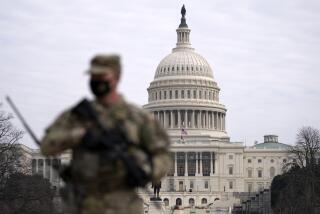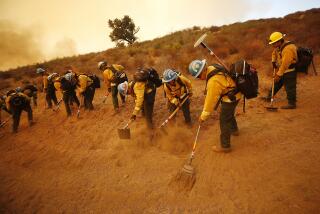Bush Vows to Expand Once-Threatened ‘Domestic Peace Corps’
WASHINGTON — Sen. John McCain (R-Ariz.) once tried to kill it. President Bush was once lukewarm toward it. Sen. Rick Santorum (R-Pa.) denounced it as a program for “kids to stand around a campfire to hold hands and sing ‘Kumbaya’ at taxpayers’ expense.”
But AmeriCorps, the national service program often called a “domestic Peace Corps,” won a big vote of support Tuesday night from President Bush, who proposed its expansion.
And some former skeptics cheered him on.
“I’m very glad he’s doing this,” said McCain, who is proposing his own measure to expand national service. “I was skeptical at first of whether it would work or not, but it’s worked extremely well.”
In addition to a boost for AmeriCorps, which now has 50,000 volunteers, Bush proposed beefing up the existing Senior Corps of retirees and asking them to help police, fire and neighborhood watch associations. Together, the Senior Corps and AmeriCorps would aim to recruit 200,000 new volunteers, Bush said.
The president also proposed doubling the number of Peace Corps volunteers over five years and giving it new missions to Islamic nations. Aides said that would return the agency to its 1966 peak of 15,000 volunteers.
“My call tonight is for every American to commit at least two years--4,000 hours over the rest of your lifetime--to the service of your neighbors and your nation,” Bush said. The volunteer efforts would fall under a new USA Freedom Corps, an umbrella agency to be run by an assistant to the president.
In what officials said was a coincidence of timing, the California state volunteerism office on Tuesday unveiled a new Web site that aims to match Californians with volunteer opportunities in their own communities. The site can be reached through the “Volunteer Here” icon at https://https://www.goserv.ca.gov.
Typically, AmeriCorps workers spend a year building affordable homes, teaching children to read or serving communities in other ways, in return for a living allowance and $4,725, which must be used for tuition or education loans. The program now costs about $400 million annually.
Republicans have not always been fans.
A pet project of President Clinton, AmeriCorps was created in 1993 over the objection of many Republican lawmakers, who later made several attempts to kill it.
Asked in 2000 whether he supported the program, Bush, then a presidential candidate, said he wanted to evaluate its effectiveness.
But the Sept. 11 attacks led to an outpouring of civic-mindedness, and politicians of both parties said the nation should take advantage of the new interest in volunteerism.
At AmeriCorps, inquiries from potential participants jumped by 30% after Sept. 11, though they have since fallen. In California, inquiries rose 48% after Sept. 11, said Chuck Supple, director of Gov. Gray Davis’ Office on Service and Volunteerism.
Now both parties are trying to claim AmeriCorps, or at least its spirit, as their own.
“We always saw it as a defining ‘New Democrat’ issue, an antidote to the left’s attitude that you can get something for nothing from the government and the right’s politics . . . that basically said ‘every man for himself,’ ” said Will Marshall, an early champion of AmeriCorps and president of the Progressive Policy Institute, a centrist Democratic think tank.
“The Republicans hated it,” Marshall added. “They derided it as paid volunteerism and a feel-good jobs program.”
Leslie Lenkowsky, chief executive of AmeriCorps’ parent agency, the Corporation for National and Community Service, said the roots of the program run to the administration of the first President Bush, who created a commission to explore ideas such as AmeriCorps. But because Clinton made the program a significant part of his 1992 presidential campaign, Republicans in Congress initially resisted the idea.
In 2000, 49 of the 50 governors--the one abstainer was a Republican--signed a letter urging continued support for AmeriCorps, Marshall said. They included Bush, then governor of Texas.
McCain and other Republican lawmakers had reversed their initial opposition to AmeriCorps well before the Sept. 11 attacks. “The idea of national service and causes greater than yourself was a whole theme of my presidential campaign,” said McCain, who ran for the GOP nomination in 2000. “So I’m pleased the president is proposing this in his State of the Union address.”
Legislation proposed by McCain and Sen. Evan Bayh (D-Ind.) would boost the number of AmeriCorps workers fivefold, to 250,000, by 2010. Half of the new workers would take positions related to homeland security.
In addition, the bill would require colleges to devote 25% of their federal student aid dollars to community service jobs, up from 7% today.
And it would create a shorter-term enlistment option for the armed forces--18 months of active duty plus 18 months of reserve duty in return for an $18,000 bonus above military pay. McCain said the minimum enlistment today is three years, four for most jobs. The cost of the bill would be $2.6 billion in the first year, a Bayh aide said.
Santorum, who once derided AmeriCorps, has proposed a bill that, his aides say, would allow AmeriCorps workers to serve in a wider variety of communities.
Charles Cook, a political analyst, said expanding national service programs makes good political sense in addition to having the practical effect of taking advantage of the current interest in volunteerism.
He said the idea would remind voters that Bush ran as a “compassionate conservative” and would allow him to reach beyond the “laundry list of issues” in his State of the Union address to push Americans to a higher calling.
More to Read
Sign up for Essential California
The most important California stories and recommendations in your inbox every morning.
You may occasionally receive promotional content from the Los Angeles Times.










